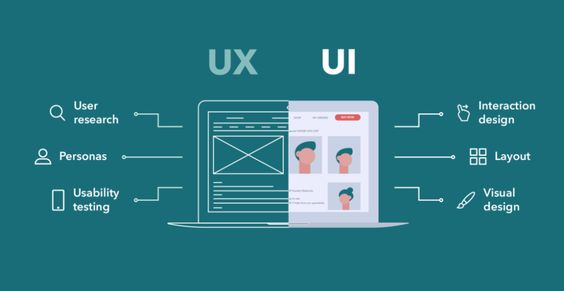I. Introduction
In the fast-paced digital world, user experience (UX) and user interface (UI) play a crucial role in web development. UI refers to the visual and interactive elements of a website, while UX encompasses the overall user journey and perception. In this article, we will delve into the significance of UI/UX in web development, understanding their individual roles, and how they synergize to create engaging and user-centric web experiences.
II. Understanding the Role of User Interface (UI) in Web Development
A. UI: The Visual and Interactive Elements of Web Design
User interface is the visual representation of a website, comprising layout, colors, typography, icons, and buttons. It focuses on creating an aesthetic and intuitive design that encourages user engagement.
B. Design Principles for Intuitive and User-Centric Interfaces
UI design principles, such as simplicity, consistency, and clarity, ensure that users can easily navigate the website and perform desired actions.
C. Interaction Design: Creating Meaningful User Interactions
Interaction design focuses on how users interact with the website’s elements and how the interface responds to their actions.
D. Information Architecture: Organizing Content for Seamless Navigation
Information architecture involves structuring content logically, making it easy for users to find what they need.
III. Exploring the Role of User Experience (UX) in Web Development
A. UX: The Overall User Journey and Perception of a Website
User experience encompasses the entire journey of users as they interact with a website, including their emotions, thoughts, and impressions.
B. The Importance of User-Centered Design in Web Development
UX emphasizes designing with users’ needs and preferences in mind, ensuring a positive and delightful experience.
C. Addressing User Needs and Pain Points for Enhanced UX
Understanding user needs and pain points enables designers to create solutions that solve real problems and improve user satisfaction.
IV. The Synergy of UI and UX in Web Development
A. How UI and UX Work Together to Create a Cohesive Web Experience
UI and UX are interdependent, as a visually appealing interface is meaningful only when it enhances the overall user experience.
B. Striking the Balance Between Visual Appeal and Usability
Designers must find a balance between aesthetics and usability to create a seamless and delightful experience.
C. Designing for Emotional Engagement and Brand Consistency
A well-crafted UI/UX can evoke emotional responses from users and reinforce brand identity and values.
V. Visual Design and Aesthetics in UI/UX
A. The Impact of Visual Elements on User Perception
Colors, imagery, and typography influence users’ emotions and overall perception of the website.
B. Choosing Color Schemes, Typography, and Imagery for Effective Communication
Selecting the right visual elements that align with the brand and communicate the intended message effectively.
C. Creating Consistent and Brand-Compliant Visual Designs
Consistency in visual elements across the website fosters familiarity and a sense of coherence.
VI. Usability and Accessibility in UI/UX
A. The Role of Usability in Simplifying User Interactions
Designing intuitive navigation and interactions that require minimal effort from users.
B. Designing Intuitive Navigation and User Flows
Thoughtful user flows ensure users can easily navigate through the website and achieve their goals.
C. Ensuring Web Accessibility for Users with Disabilities
Inclusive design practices ensure that all users, including those with disabilities, can access and use the website.
VII. Responsive Design and UI/UX
A. Adapting UI/UX for Different Screen Sizes and Devices
Responsive design ensures a consistent experience on various devices, from desktops to mobiles.
B. The Importance of Responsive Design in a Mobile-First World
Given the prevalence of mobile devices, designing for mobile-first is essential for reaching a broader audience.
C. Best Practices for Designing Responsive Web Experiences
Optimizing images, content, and interactions for different screen sizes.
VIII. Prototyping and Iterative Design in UI/UX
A. The Value of Prototyping for Testing and Refining Designs
Prototyping allows designers to visualize and validate their concepts before development.
B. Embracing an Iterative Design Process for Continuous Improvement
Iterative design involves continuous refinement based on feedback and testing.
C. Gathering Feedback and Making Data-Driven Design Decisions
User feedback and data-driven insights guide improvements to UI/UX.
IX. Conducting User Testing for UI/UX Optimization
A. The Benefits of User Testing in Understanding User Behavior
User testing provides valuable insights into user behavior and preferences.
B. Different Types of User Testing: Usability Testing, A/B Testing, and more
Various user testing methods help identify areas for improvement and validate design decisions.
C. Incorporating User Feedback to Enhance UI/UX
Acting on user feedback enhances the user experience and ensures user satisfaction.
X. The Evolving Landscape of UI/UX in Web Development
A. UI/UX Trends and Innovations
Keeping up with the latest trends ensures websites remain relevant and competitive.
B. Design Systems and UI Component Libraries
Design systems streamline the design and development process while maintaining consistency.
C. The Role of UI/UX in Emerging Technologies (e.g., AI, AR, VR)
UI/UX will play a crucial role in shaping user interactions with emerging technologies.
XI. Collaboration between UI/UX Designers and Web Developers
A. The Importance of Cross-Disciplinary Collaboration
Effective collaboration between designers and developers ensures seamless implementation of UI/UX.
B. Bridging the Gap Between Design and Development
Open communication and shared understanding facilitate a cohesive product.
C. Building a Strong Partnership for Successful Web Projects
A collaborative approach enhances efficiency and results in better user experiences.
Conclusion
A. The Indispensable Role of UI/UX in Modern Web Development
UI/UX is central to creating web experiences that engage and delight users.
B. Emphasizing the Impact of UI/UX on User Satisfaction and Business Goals
Investing in UI/UX yields long-term benefits and contributes to business success.
C. Striving for Excellence in UI/UX to Create Memorable Web Experiences
Prioritizing UI/UX in web development ensures websites that leave a lasting impression on users.





